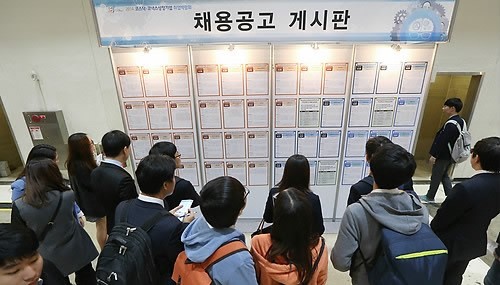The government plans to increase spending to create more jobs, boost innovation-led growth, narrow income inequality and expand the social safety net in the face of rising uncertainties, the country's economic policy chief said Thursday.
In a policy report to the National Assembly, the ministry said it would implement a set of policies as planned in the future to improve job market conditions and provide support for the underprivileged.
The ministry also said it would maintain the expansionary fiscal policy to help Asia's fourth-largest economy grow and actively deal with fallout from downside risks, such as growing trade conflicts between major economies, a slowdown in facility investment and dismal job conditions at home.
 |
(Yonhap) |
"Our top priority will be placed on creating jobs given recent employment conditions," Finance Minister Kim Dong-yeon told lawmakers. The minister said the sobering reality is that job additions are still weak in terms of quantity, although the quality of jobs had improved slightly.
"The government will roll out additional measures to stabilize housing prices, if necessary, and we will continue to monitor the housing market," he said.
In July, the ministry cut its growth estimate to 2.9 percent this year from its earlier projected 3 percent and sharply slashed its job creation target to 180,000 from its earlier estimated 320,000.
Last year, the economy expanded 3.1 percent. The ministry's growth revision is higher than the Bank of Korea's latest growth forecast. Earlier in the day, the central bank trimmed its growth outlook for the year to 2.7 percent from 2.9 percent, following a 0.1 percentage-point reduction early this year.
The ministry said exports and domestic demand show solid growth, while facility investment remains sluggish. Externally, the trade war between China and the US, rate hikes in the US and instability in some emerging markets are posing a downside risk to the country, it added.
As part of efforts to support the underprivileged and expand the social safety net, the government will increase the amount of tax refunds for low-income households and the beneficiaries.
In particular, to help cushion their difficulties, the government will sharply expand the recipients of the earned income tax credit scheme that calls for refunding taxes to low-income families and the volume of its financial support, according to the ministry.
To reduce the burden on small shop owners, the government will seek to prod card firms to cut commission rates charged on them to reduce their increased costs that stem from a hike in the country's minimum wage hike.
The Moon Jae-in administration increased the minimum wage for all workers by 16.4 percent this year to 7,530 won from 6,470 won in 2017, after setting a goal of raising hourly pay to at least 10,000 won by 2020.
The government is preaching a policy of "income-driven growth" that calls for a virtuous cycle of increasing household income and spending.
But the country's job market conditions remained in the doldrums, with job creation not showing a sharp improvement.
The number of employed people reached 27.05 million in September, up 45,000 from the same month in 2017.
The number of newly added jobs improved last month, after staying below 10,000 per month for the second straight month.
Kim painted a dark picture for October's jobs data.
"It is not easy to see an improvement in job conditions this month," Kim said.
He said earlier that the government is working on whether to apply the minimum wage hike differently for some sectors and regions.
The minister said the currency authorities did not intervene in the currency market to help local exporters gain price competitiveness in overseas markets.
"The authorities only took steps to curb the one-sided moves in the currency market," Kim said. "Except for such cases, we have not intervened (in the currency market)." (Yonhap)








